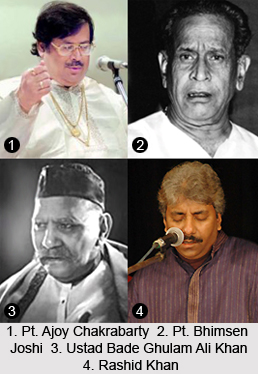"He is a portion of the loveliness
Which once he made more lovely" - Percy Bysshe Shelley
 The Indian classical vocalists` genre goes back to primeval centuries in history, with its enriched society of famed men and women, who made their way to the top to create history in the forthcoming ages. Each had been endowed with extraordinary and incomparable qualities in their own specific and unusual way. Leaving some of the legends who have already breathed their last, Indian classical music is blessed enough to still have to themselves some classical singers weaving their magic. Their timbre of rendition is excellent in every sphere they keep their hands on. The vocal quality, the range, the depth of voice, the capability to possess a free flow is some of the very few qualities that can be witnessed in the maestros. Moreover, the singers are each gifted with diverse qualities and pitches in voice, making a concert even more fascinating and bewitching when in jugalbandi. The facts behind every singer`s growing up, their struggle for perfection, they being trained by their gurus, add more to an interesting read of the astounding life that the vocalists had spent in determination to attain their aspiration.
The Indian classical vocalists` genre goes back to primeval centuries in history, with its enriched society of famed men and women, who made their way to the top to create history in the forthcoming ages. Each had been endowed with extraordinary and incomparable qualities in their own specific and unusual way. Leaving some of the legends who have already breathed their last, Indian classical music is blessed enough to still have to themselves some classical singers weaving their magic. Their timbre of rendition is excellent in every sphere they keep their hands on. The vocal quality, the range, the depth of voice, the capability to possess a free flow is some of the very few qualities that can be witnessed in the maestros. Moreover, the singers are each gifted with diverse qualities and pitches in voice, making a concert even more fascinating and bewitching when in jugalbandi. The facts behind every singer`s growing up, their struggle for perfection, they being trained by their gurus, add more to an interesting read of the astounding life that the vocalists had spent in determination to attain their aspiration.
Indian classical music can be broadly be classified into two distinct categories of the Hindustani classical and Carnatic music. And this very rich and enriched heritage has incredibly aided ardent listeners, courtesy the Indian classical vocalists and their tuneful melody. Another major governing factor about these Indian classical vocalists and their songs is that they can be enjoyed under any circumstance, be it in any concert or in a tranquil atmosphere, with just the music playing to the ears. The range in the vocal chords, the sudden rise and drop while an ongoing song, heightens the effect of the song, haunting to listen, with perhaps applauds falling short to praise. Classicism is absolutely an area with which India can be very proud, considering the legendary lineage from times of Akbar in Mughal empire.
It is universally believed that while Tansen was engrossed his riyaaz, the heavens used to pour down on earth, in the form of incessant rain. With such stories still lingering in present times, classical singers have not and never can fade away into the oblivion.
The amount of effort that is always exerted, the painstaking journey for the Indian classical vocalists can of course be summarised into a book, this being too a space to be described in details. And this even merely remains an understatement. The laurels, the honours both from the country and abroad for these singers, further make the classical music atmosphere prestigious, with their listeners ever eager and anxious for future predictions, concerts or even musical piece in solo format. Never has there been noticed any form of biasness with relations to male chauvinism, with female vocalists shining to the top. Indian classical vocalists can be jotted into some of the few names, besides the unsurpassed men and women coming up every new day. However, the masters are: Tansen, Ustad Rehmat Khan, Ustad Alladiya Khan, Vishnu Digambar Paluskar, Ustad Abdul Karim Khan, Ustad Faiyaz Khan, Pt. Omkarnath Thakur, Ustad Amir Khan, Pt. Basavraj Rajguru, Pt. Mallikarjun Mansoor, Kesarbai Kerkar, Hirabai Barodekar, Gangubai Hangal, Pt. Kumar Gandharva, Pt. Chintaman Raghunath Vyas, Pt. Jitendra Abhisheki, Malini Rajurkar, Ustad Bade Ghulam Ali Khan, Pt. Bhimsen Joshi, Pt. Jasraj, Kishori Amonkar, Pt. Rajan Mishra & Pt. Sajan Mishra, Veena Sahasrabuddhe, Umakant and Ramakant Gundecha and Rashid Khan.
Besides the above-mentioned notables, the Indian classical vocalists` genre has also witnessed and is still witnessing the rise and further rise of a bunch of 21st century exceptional singers. Each one of them is famed both nationally and internationally, bringing in umpteen accolades and honours to make the country even more proud. It can thus be stated that, all is not lost to dust and compromises have not been made to surrender to westernised pop and rap culture. To name some of them, would additionally intensify the list of extraordinaires. They are: Ustad Ghulam Mustapha Khan, Sulochana Brahaspati, Begum Parveen Sultana, Prabha Atre, Pt. Prabhakar Karekar, Pt. Ajoy Chakrabarty, Ulhas Kashalkar, Padma Talwalker, Ashwini Bhide Deshpande, Shruti Sadolikar, Shanti Sharma, Ganapati Bhatt and M. Ventakesh Kumar.




















